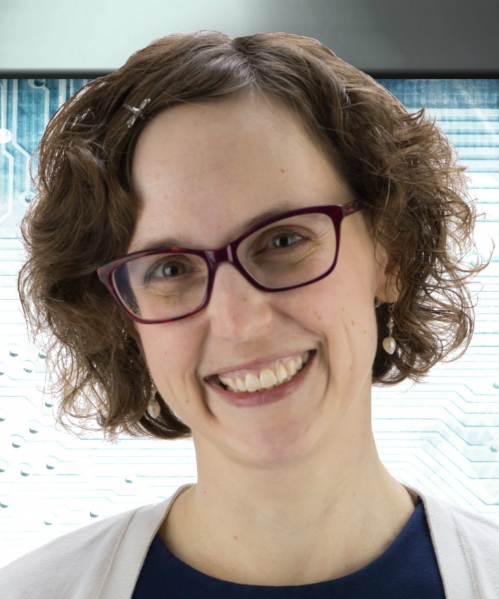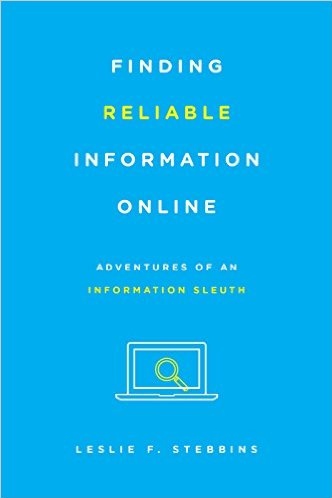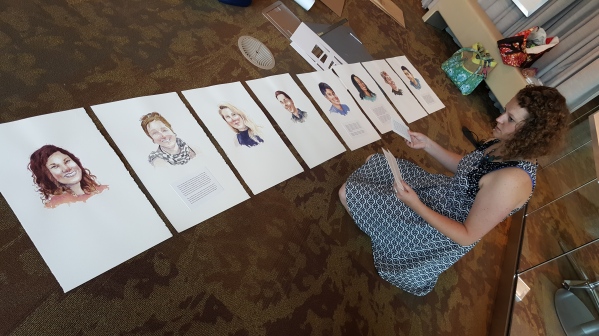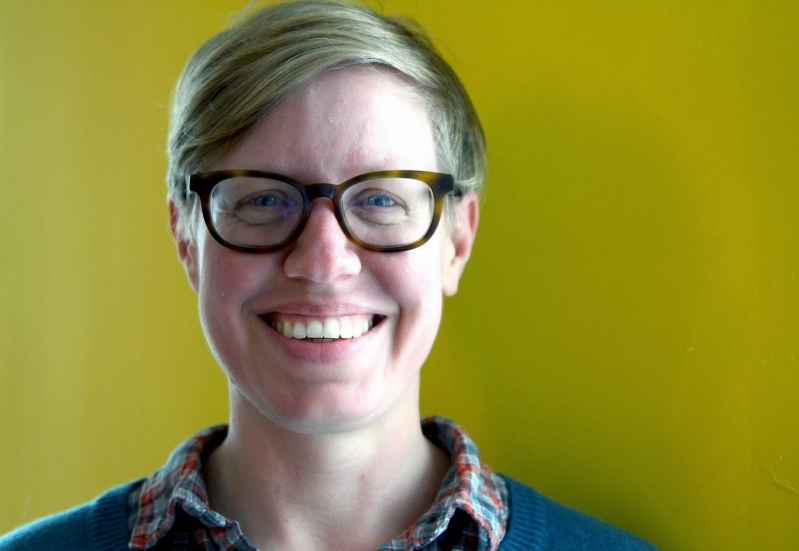Interested in Instruction: Sharing What We Do with Each Other
Gayle Schaub Hello! It's been a really busy semester at GVSU, and I imagine you can all say the same where you are. I saw many of you at the MIX conference in August and, since then, the weeks have been filled with instruction sessions, student orientations, conferences, faculty meetings, lesson planning, report writing, and more. We're almost into holiday party season, followed by vacations and celebrations, and then we begin it all again! Before that, I'd like to introduce you to a couple of librarians, share an update on an exhibit, and invite you to consider sharing your stories with the group.
Send in your ideas, lessons, projects, fabulous or flop; we learn from both.
Want to be featured in the Librarian Profile section? We'd love to meet you!
We welcome ready-to-print content or are happy to write up your thoughts and notes. Send to: schaubg@gvsu.
Gayle Schaub, UX IL Chair
GVSU Libraries
Librarian Profile
 Kelly Frost is the User Education/Experience Librarian at Kellogg Community College. This fall her library participated in the Michigan Libraries for Life campaign to raise awareness for and increase participation in the Michigan Organ Donor Registry. The campaign is organized amazingly well by Gift of Life Michigan and the University of Michigan Taubman Health Sciences Library. They provide training, giveaways, press releases, and social media coverage. Kelly encourages any library not yet involved in this program to consider signing up. More information at Michigan Libraries for Life. Kelly Frost is the User Education/Experience Librarian at Kellogg Community College. This fall her library participated in the Michigan Libraries for Life campaign to raise awareness for and increase participation in the Michigan Organ Donor Registry. The campaign is organized amazingly well by Gift of Life Michigan and the University of Michigan Taubman Health Sciences Library. They provide training, giveaways, press releases, and social media coverage. Kelly encourages any library not yet involved in this program to consider signing up. More information at Michigan Libraries for Life.
At the end of January, Kelly will take her first sabbatical leave and move with her family to Tokyo for six months. While in Japan, she plans to do an extensive reading of the disability studies field and also blog about her experiences traveling and living in Japan with an eye to disability and accessibility. Tokyo is preparing to host the Paralympics in 2020 and has promised to make accessibility a cornerstone of new development. She hopes to meet with Japanese librarians and learn about information literacy instruction in a Japanese context.
Tale from the Trenches: Responsive Librarianship, Critical Librarianship
Angie Kelleher, Alma College During my thirteen years at Alma I’ve taken on a wide range of different tasks. In my current position I oversee Circulation and Interlibrary Loan, as well as teach information literacy sessions, including a 2-credit course.
Changing it Up
I am proud of two recent projects, which are new this year. The first is an overhaul of how we introduce all of our First-Year Seminar (FYS) classes to the library. We were unhappy with the participation in our previous FYS instruction program and redesigned it so that every class would receive an identical session. We then borrowed a fantastic idea (thanks, Amanda Kraft and Aleck F. Williams Jr., #Shelfies are Encouraged) to create a book hunt using Twitter. We used an existing Library of Congress call number video, and created our own (very basic) video showing students how to navigate the library using LC and our maps. Each FYS student was given links to the videos, and told to watch them before coming for their library session. Once in the library, we split them into pairs, gave them a title and call number, and told them to go find their book. After finding it, they were to take a selfie with the book, and tweet it to the library account. This exercise was very popular, both with students and professors. It took no longer than 30 minutes for each class, the students learned one useful skill, and they had a positive first interaction.
Responsive Programming
The second recent project involved a Black Poetry Night. Alma College is a predominantly white institution, and we always need to challenge ourselves to provide services for, and recognize the contributions of, all of our students and staff. Since I began working at the library, I have developed a tradition of hosting visiting authors. We typically have one author/poet reading at the library each term, often in collaboration with the English Department. I wanted to showcase the poetry of our Black students, and other Black poets. I met with our Multicultural Student Union (MCSU), to enlist them as co-sponsors. I invited several students individually, and also did lots of publicity. The event was a success! I got wonderful feedback from faculty and students, including a personal thank you from the Vice-President of our MCSU: “Thank you for making this event what it was. It speaks volumes to me, to know that there is a large faculty and staff support! Thank you again, and MCSU looks forward to partnering with the Library in the future.”
Critical Librarianship
Over the last few years, I’ve become aware of the critlib movement (I was a social worker before I became a librarian, so this is in many ways a natural fit for me). Critlib is about critical librarianship, “a movement of library workers dedicated to bringing social justice principles into our work in libraries" (critlib.org). I love finding ways to make libraries work for everyone. I can incorporate social justice principles into my instruction work, in the way that I structure my classes and the content I choose. I can make the Circulation Desk more accessible and inclusive, by examining our hiring and service practices. I can diversify what I purchase for the collection. I can do different types of programming, displays, and campus outreach. I can educate myself and my staff about LGBTQ+ issues, racism, sexism, ableism, xenophobia, religious discrimination, and other social justice topics. If libraries are to be accessible to everyone, we need to stop pretending that we are neutral. The old ways of doing things inherently privilege more traditional types of patrons. We must challenge ourselves to see if our practices are really responding to the information and service needs of all of our patrons.
Information Sleuthing! Book Review
Christina Radisauskas, Aquinas College  Leslie Stebbins is a delight. Her book, Finding Reliable Information Online: Adventures of an Information Sleuth, is an entertaining jaunt into the secrets of good research. Each chapter is dedicated to a different type of information - health, restaurant reviews, scholarly research, travel, and science, and all are expressed in friendly, informal story-like narrative, riddled with humor and fabulous tips! Written for the layperson and IL specialist alike, this book provides great IL substance without dragging your soul through a boredom chamber. She even includes classroom exercises that accompany the chapters on her website and bases them on the Framework for Information Literacy. I've used material from her chapters on finding health and scholarly information in my credit-bearing IL class successfully. Students respond positively to the stories surrounding the information search, and I've seen several faces make that 'huh-I-never-thought-of-that' expression! Leslie Stebbins is a delight. Her book, Finding Reliable Information Online: Adventures of an Information Sleuth, is an entertaining jaunt into the secrets of good research. Each chapter is dedicated to a different type of information - health, restaurant reviews, scholarly research, travel, and science, and all are expressed in friendly, informal story-like narrative, riddled with humor and fabulous tips! Written for the layperson and IL specialist alike, this book provides great IL substance without dragging your soul through a boredom chamber. She even includes classroom exercises that accompany the chapters on her website and bases them on the Framework for Information Literacy. I've used material from her chapters on finding health and scholarly information in my credit-bearing IL class successfully. Students respond positively to the stories surrounding the information search, and I've seen several faces make that 'huh-I-never-thought-of-that' expression!
I recommend this book - it's a breath of fresh air!
Finding Reliable Information Online: Adventures of an information Sleuth
Leslie F. Stebbins
Rowman & Littlefield, 2015
Connected: An Exhibit of Shared Laker Experiences
Gayle Schaub ICYMI, in the first UX IG newsletter, I mentioned that we at the Mary Idema Pew Library were planning a fall exhibit for new students, to welcome them and encourage in them a sense of belonging within the Laker community. Well, we were really pleased with the way the exhibit looked, the interactions it inspired, and the feedback it received.

The exhibit featured the personal stories of a diverse group of GVSU students in both visual and audio format. A recent GVSU art grad painted watercolor portraits of some of the students, whose stories were told in text accompanying the images. Other students' stories were featured in short audio files, shared via headphones or a separate shareable link.
Students got the chance to paint a small circle with colors that represented the feelings they were experiencing about being new to campus and new to college in general. For many, this was a meaningful way to share feelings of anxiety or joy without having to share too much at a time of such intense uncertainty.
It was a wonderful opportunity to be part of a project that welcomed and comforted students and let them know the library was a safe place. Any of us who worked on this exhibit are happy to share our thoughts and experiences with those interested in creating something in their space.
MI-ALA Annual Conference: Keynote Speaker and Call for Proposals
The MI-ALA Conference Committee is thrilled to announce Emily Drabinski as our keynote speaker for the 2017 Annual Conference.
Click here for a printer friendly version of this web page.

Emily Drabinski is Coordinator of Library Instruction at Long Island University, Brooklyn. She is editor of Gender and Sexuality in Information Studies, a book series from Library Juice Press/Litwin Books, and sits on the board of Radical Teacher, a journal of socialist, feminist, and anti-racist teaching practice. Emily serves as secretary of the Long Island University Faculty Federation Local 3998, NYSUT/AFT, AFL-CIO.
For more info about Emily and a list of her publications, see her website at http://www.emilydrabinski.com/
Call for Program Proposals Deadline: Friday, December 12, 2016
MI-ALA invites you and your colleagues to submit presentation proposals for the second annual conference. Please consider sharing your innovations, creative endeavors, and practical solutions in librarianship. Questions about proposals can be sent to Hazel McClure ( mcclureh@gvsu.edu) or Cara Cadena ( cadenac@gvsu.edu). Questions about the conference in general can be sent to conference@miala.org.
Calendar of Events Import
|